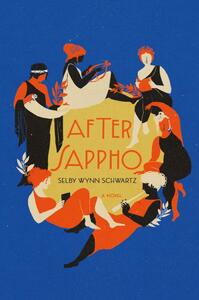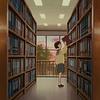Take a photo of a barcode or cover
So many dead in childbirth, she observed, and so few by shipwreck.
This was fun.
This was fun.
emotional
reflective
sad
medium-paced
Plot or Character Driven:
Character
Strong character development:
Yes
Loveable characters:
Yes
Diverse cast of characters:
N/A
Flaws of characters a main focus:
No
2.5 stars
Well... this was quite a tedious book to read. On the one hand, I really enjoyed some aspects of it. It explores women's rights, sapphism, history... while focusing on many (more or less) famous figures. I can see how it tried to show their impact on culture and society through a variety of vignettes depicting their lives and their fights but... I thought it felt flat.
I usually don't mind different narrators but in this instance, adding to the fact that it was not in a particularly chronological order, it ended up being quite messy and felt more like a series of Wikipedia entries than characters whose lives get intertwined... I didn't get particularly attached to anyone mentioned, and I had to google most of the people mentioned because it was so brief that I couldn't get the whole picture and needed more information...
There wasn't much diversity either as most of the women present in this book were white, coming from rich families or at least being provided high education. There were some exceptions but they were barely mentioned, and their fights were kind of ignored. A bit ironic for a book using "We" as a narrator...
I did however enjoy the parts about Sappho and extracts of her work, as well as the parallel with Cassandra that were really well done.
Overall, I enjoyed the idea of this book but the execution wasn't for me. Maybe I would have enjoyed it better if it was truly a non fiction and going more in depth in the biographical aspect. It was a very nice base for discussions in a book club though!
Well... this was quite a tedious book to read. On the one hand, I really enjoyed some aspects of it. It explores women's rights, sapphism, history... while focusing on many (more or less) famous figures. I can see how it tried to show their impact on culture and society through a variety of vignettes depicting their lives and their fights but... I thought it felt flat.
I usually don't mind different narrators but in this instance, adding to the fact that it was not in a particularly chronological order, it ended up being quite messy and felt more like a series of Wikipedia entries than characters whose lives get intertwined... I didn't get particularly attached to anyone mentioned, and I had to google most of the people mentioned because it was so brief that I couldn't get the whole picture and needed more information...
There wasn't much diversity either as most of the women present in this book were white, coming from rich families or at least being provided high education. There were some exceptions but they were barely mentioned, and their fights were kind of ignored. A bit ironic for a book using "We" as a narrator...
I did however enjoy the parts about Sappho and extracts of her work, as well as the parallel with Cassandra that were really well done.
Overall, I enjoyed the idea of this book but the execution wasn't for me. Maybe I would have enjoyed it better if it was truly a non fiction and going more in depth in the biographical aspect. It was a very nice base for discussions in a book club though!
One of the more uniquely formatted books I’ve ever read. Readers might find it difficult to access the format of the text, unless they have a baseline knowledge of Sappho’s work being fragmented. The author does a fantastic job at taking the reader through rarely covered moments throughout Sapphic/Queer history, diving into famous sapphists and the like. The narrative is written in the form of a Greek chorus. The writing feels sumptuous and the vignettes are as mysterious and erotic as the best of sappho’s fragments.

Romaine Brooks, Una, Lady Troubridge, 1924, oil on canvas, Smithsonian American Art Museum
I would say I liked this better in concept than in execution. Schwartz uses a kind of collective chorus-like narrator to highlight and connect late 19th/early 20th century lesbian writers/artists with Sappho. It's a blending of forms (speculative biography, alternative history, history, etc.) that feels somewhat hampered by that blend (i.e., you don't get the depth/insight into these fascinating figures you would with a historical/nonfiction piece, but you don't get the emotional development or narrative pull you might from a more traditional novel). Despite for a lull in the middle of hopscotching amidst these connected vignettes, I did find myself rather drawn to the reading overall, as if a mythical collective of sapphists were being called into existence.
In addition to learning about a number of figures completely unfamiliar to me, I really enjoyed the humor and the exploration of language.
Humorous samples:
"Some of us were sent by our families to distant schools to be finished, so that we would come to our proper ends. But it was not our end. It was barely our beginning."
"She had her ways of escaping the century."
"… naked all afternoon they apostrophized each other in the vocative."
"In fact we had learned to motor by reading the manuals. It was not unlike tribadism or clitorism, if you studied the diagrams closely you could generally manage the manoeuvers once en route."
"Reluctantly the Italian politicians recognized the emergence of foemina mercatrix, a female merchant, as if she were a new species of beetle."
Besides language playing a central role in the artistic lives of these writers/actresses, it plays a social one (a limiter in terms of laws granting rights/power; a definer in terms of what roles/behavior were acceptable/"normal"). Sometime the classical forms/grammars limit the actual mood/thinking even possible so that progress continually depends on stretching these forms and abandoning them when necessary. Literature becomes a field of potential victory where history has failed to be so for women---social/sexual relations in narrative open up the possibility for such relations in reality (or, rather, for them to be accepted/acknowledged in public life).
"For so long we had said to ourselves that we were going to be Sappho that Cassandra’s words were strange on our tongues. We pronounced them in halting litany, as if we were reciting the tenses of foreign verbs.
We who had come after Sappho would now go onwards.
From her fragments would emerge our new and modern forms.
There would be a future for the mood we lived in.
No longer would we follow in the style of, wistful and optative.
… We discarded our classical grammars."
--------------------------------
WORDS/PHRASES/PERSONS NEW TO ME
aorist | aithussomenon | pannuchides | genitive | kletic | puerperal | beudos | tryphé | vocative | optative | Phaon | lexicographer | Tribabes/tribadism | viragos | Dictionnaire Érotique Moderne | Chrysothemis | clitorism | veronal | Una, Lady Troubridge | piquant | man camelo tuti | maenadic | Ladies Almanack | beriboned | lucbrare | regio decreto of 1927 | brava gente | insieme siamo partita, insieme torneremo
After Sappho is a song that must be heard by all. It is a paean that generations of people must pay attention to. Of the struggles, the triumphs, the failures, & then of winning and the struggle to keep all of it sustained – Schwartz takes us through fragments of the lives of historical women, transporting us across time – from 1880s Italy to 1920s Paris and London. There are so many women we meet along the way, many kindred souls, many whose loves and lives we relate with, their broken dreams, hearts full of love, aspirations, yearning for independence, to be seen, to transform to Sappho.
As a queer person, this book spoke like no other title on the Longlist. With every reread my heart has been fuller, my mind freer, and my thoughts wilder. After Sappho is about women reading books in trees, of Virginia Woolf falling in love with Vita Sackville-West, it is about liberation, need to express oneself, about how Henrik Ibsen took a woman’s story and made it his, about men who do that on a daily basis, about spaces that are waiting to be reclaimed by women, about stories that end in the year 1928 in the book, but are still going on and on and on, encompassing the lives and loves of women.
The prose is not only compelling but gloriously touching. After Sappho is a story of collective voices, of individual laments, of voices that will not be subdued, of voices that have been told to shut up constantly, and of voices that belong to bodies that do, think, and act as they please. Schwartz writes with humour, writes about pain, what it is to be a woman (something which I will never know, though I am constantly torn about who I am and what is my identity), she writes about everyone who is on the periphery of society. She speaks of the past, merging it with the present, predicting the future. It is about learnings – what we understand from our ancestors, women who go back and forth to learn, to understand themselves, the world at large where they are concerned.
After Sappho is a testimony to those on the margins, the outsiders; to those women who don’t fit in and don’t want to. It is about anyone who has fought, and continues to do so. As a gay man I found myself in its pages. I was another Sappho, too.
As a queer person, this book spoke like no other title on the Longlist. With every reread my heart has been fuller, my mind freer, and my thoughts wilder. After Sappho is about women reading books in trees, of Virginia Woolf falling in love with Vita Sackville-West, it is about liberation, need to express oneself, about how Henrik Ibsen took a woman’s story and made it his, about men who do that on a daily basis, about spaces that are waiting to be reclaimed by women, about stories that end in the year 1928 in the book, but are still going on and on and on, encompassing the lives and loves of women.
The prose is not only compelling but gloriously touching. After Sappho is a story of collective voices, of individual laments, of voices that will not be subdued, of voices that have been told to shut up constantly, and of voices that belong to bodies that do, think, and act as they please. Schwartz writes with humour, writes about pain, what it is to be a woman (something which I will never know, though I am constantly torn about who I am and what is my identity), she writes about everyone who is on the periphery of society. She speaks of the past, merging it with the present, predicting the future. It is about learnings – what we understand from our ancestors, women who go back and forth to learn, to understand themselves, the world at large where they are concerned.
After Sappho is a testimony to those on the margins, the outsiders; to those women who don’t fit in and don’t want to. It is about anyone who has fought, and continues to do so. As a gay man I found myself in its pages. I was another Sappho, too.
3.5
This was a very interesting book. If I could go back I would’ve read it instead of using an audiobook, since I found it difficult to follow the names it mentioned. All around a good book and I would recommend it to everyone especially if you’re into feminist writings. I’ve been meaning to read Sappho and this piece might’ve pushed me to do it sooner.
This was a very interesting book. If I could go back I would’ve read it instead of using an audiobook, since I found it difficult to follow the names it mentioned. All around a good book and I would recommend it to everyone especially if you’re into feminist writings. I’ve been meaning to read Sappho and this piece might’ve pushed me to do it sooner.
challenging
inspiring
reflective
slow-paced
Plot or Character Driven:
Character
Strong character development:
No
Loveable characters:
Yes
Diverse cast of characters:
No
Flaws of characters a main focus:
No







